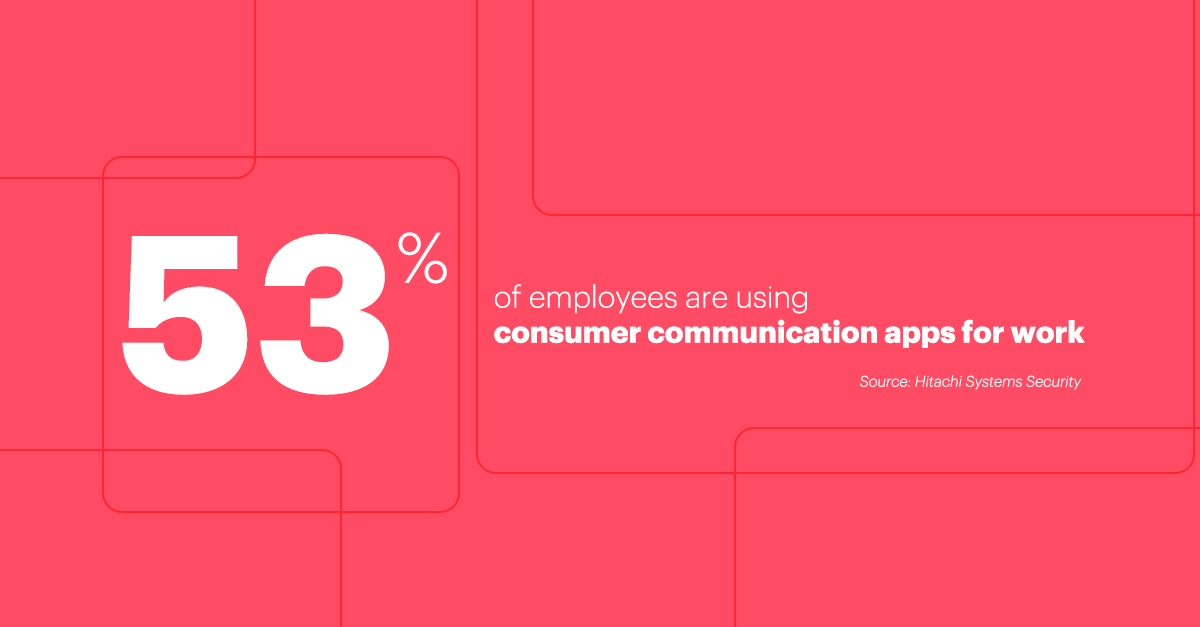In our daily lives, we all use several messaging apps and hardly ever notice any security issues, but companies and enterprises are starting to realize the importance of data security and the many risks and damage it can cause.
Secure messaging apps are becoming the most demanded tools in organizations that deal with sensitive information yet understand how important effective team collaboration is.
3 Reasons why companies strongly prefer secure messaging apps
1. Data breaches are costly
According to IBM’s research, the average cost of a data breach in the US is a whopping $3.8 million, and it takes 280 days on average to identify and contain it.
The numbers only grow higher due to the rise of hybrid work environments.
Namely, 1 in 5 IT executives says they have experienced a security breach as a result of a remote worker in 2020.
53% of employees use consumer communication apps like WhatsApp, Viber, or Telegram, for work. Although many of these apps are end-to-end encrypted, they still don’t adhere to other security standards of companies – simply because they were never meant to be used by businesses.

2. You are constantly exposed
Digital transformation has made business processes more automated and interconnected, which increases the risk of cybersecurity breaches.
With the use of secure messaging apps, companies and enterprises highly decrease security risks.

3. Customers care about data protection
Companies opt for secure messaging apps in order to protect customer data while enabling seamless team communication.

Data Protection and Privacy Risks
When unapproved use of these applications for work-related communications occurs, organizations face severe privacy and data protection risks.
All applications can suffer confidential and personal data leaks, whether accidental or intentional.
When employees use consumer messaging apps, a data breach is more complex and serious because the IT department would not be able to remotely erase all sensitive business and personal data from the messaging apps on the affected device in case the device is lost or stolen.
Consequently, such data leaks would immediately trigger breach notification obligations and requirements under applicable data protection and privacy laws such as the EU General Data Protection Regulation (GDPR), Canada’s Personal Information Protection and Electronic Documents Act (PIPEDA), and the California Data Breach Law.
These are only some of the risks that organizations of all sizes and across all industries face due to the unaware and unauthorized use of consumer messaging apps.
Since most organizations do handle sensitive information and personal data that require an adequate level of privacy and data protection, it is essential to assess and calculate the risks brought by consumer messaging apps.

Pravica is reinventing digital communication protocols
By utilizing Stacks Blockchain and its smart contracts Pravica is engineering a tamper-proof decentralized identity that is secured by the Bitcoin network and a fully decentralized storage system.
Decentralization, blockchain technology, and the promise of self-sovereign identity are what differentiates Pravica from the competition and all consumer messaging apps.
Pravica users get back control of their identity and own their data. Enterprise customers will eventually be able to use Pravica’s unified full suite of communication solutions as they automate and digitalize their business processes while meeting WEB 3.0 standards and using Blockchain technology.
About Pravica
Pravica is a unified, secure, and privacy-compliant communication suite that meets WEB 3.0 standards, is secured by Bitcoin, and uses Blockchain technology to empower user privacy and security for personal and enterprise use of all types and sizes. We combine our incalculable technical capabilities with the cutting-edge technology of Blockchain to provide unparalleled private and secure digital human interactions to transform the way people communicate.


